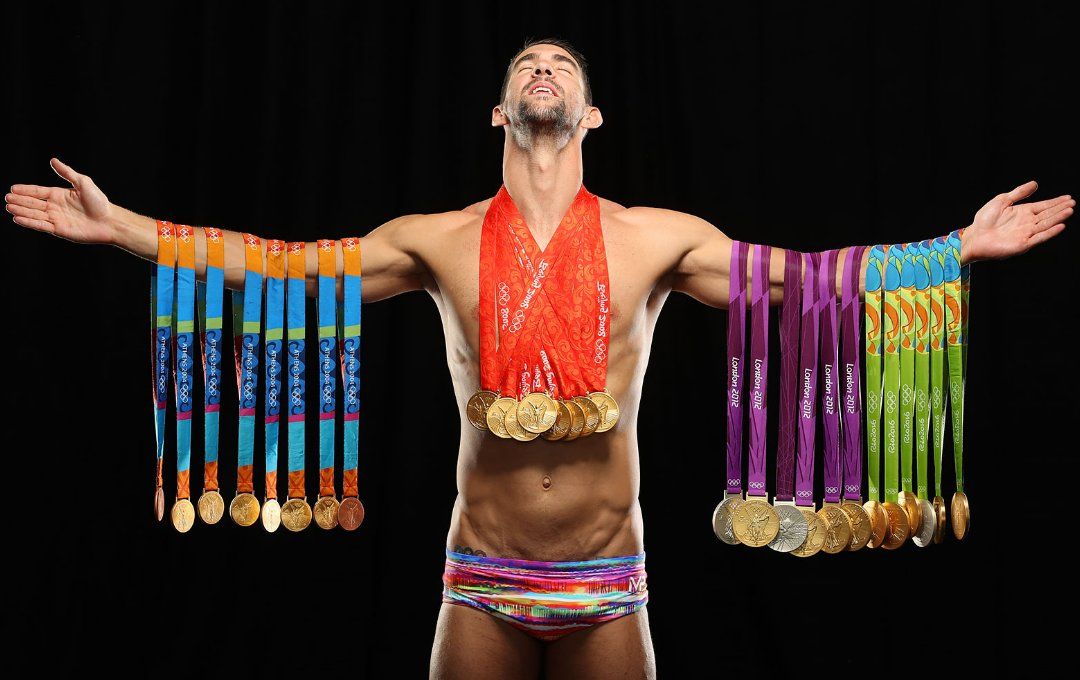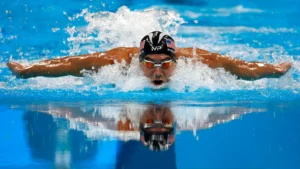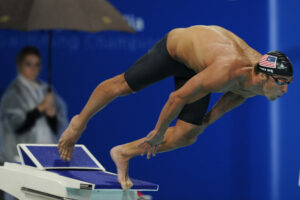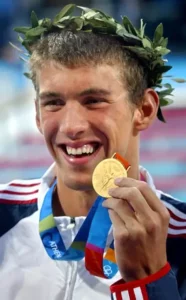
Swimming is a hard, technical sport where professional athletes spend up to six hours a day training to perfect their style and technique. Michael Phelps became one of the greatest swimmers of all time, and he knew that he wanted to be great when he was young. “This all started and began with one little dream as a kid that changed the sport of swimming and tried to do something nobody else has ever done,” said Phelps.1 Winning an Olympic medal is something that every athlete strives to achieve, but to be able to win the most Olympic medals is an accomplishment that Phelps was able to reach because of his hard work and dedication.
Athleticism was something that ran in the Phelps’ family. They were all competitors in different sports and Phelps said, “If I was playing sports, no matter what it was, my father’s direction was simple: ‘Go hard and remember, good guys finish second.’ That didn’t mean that you were supposed to be a jerk, but it did mean that you were there to compete as hard as you could.”2 This shows that his family are not only great athletes but kind people. Even though his parents went through a divorce, his family still cared and made sure he was able to find something to do that he was interested in. He got into swimming because his older sisters, Hilary and Whitney, swam. Phelps fell in love with swimming and at the age of ten he joined the North Baltimore Aquatic Club.

Bob Bowman was a coach at the club and recognized the potential that Phelps had. Bowman described Phelps: “He’s motivated by failure, he’s motivated by success, he’s motivated by money, he’s motivated by comments people make….He can take just about anything he comes across and turn it into some kind of motivation. That’s one of his greatest attributes.”3 Phelps was always training to better himself and did not stop until he got what he wanted. Bowman pushed him to train harder, and under his coaching, he was able to make the U.S. National B team at only fourteen. He then became the youngest male swimmer to go pro at the age of fifteen. Phelps trained with Bowman for the rest of his career, because they worked well together and they both wanted to achieve the same goal of winning an Olympic medal. Phelps moved around the country to wherever Bowman got a job so that he would not have to find another coach as good as him. Bowman supported Phelps throughout all of the years that he swam and was there when he set his first world record. “We started working together when he was 11, so I’ve been through the whole spectrum with him, and he’s become a fine young man,” says his swim coach.4 Although he had good parents who cared about him, Bowman acted like a true father figure to Phelps, since his real father could not be there all the time.
Phelps went to high school in Maryland at Towson High School and became a member of the swim team. While he swam there, he set many records and won a lot of titles. While swimming in high school, he had an intense training regimen of training six hours a day for six days of the week, and was on a strict diet so that his body would stay in shape. During this time, he also won six state championships and set four records. He ended up missing a lot of events throughout high school because of how dedicated he was. After high school, Phelps attended college at the University of Michigan, and was on scholarship. He ultimately decided not to swim for the NCAA, and became a professional swimmer at the age of sixteen, which led to a signed deal with Speedo to start his career in swimming, which led him to making a lot of money.

Phelps had a big advantage over most of his opponents. He is 6 feet 4 inches tall with a wingspan of 6 feet 7 inches, which allows him to take fewer and longer strokes than most of the other swimmers. His torso was also longer than his legs, making him more aerodynamic than someone who is smaller. His feet and hands act like paddles because of how big they are.5 With these advantages, he was able to do great things as long as he believed he could do it. At only fifteen years old, he attended his first training with the Olympic swim team. He would swim for about six hours a day with a minimum of 80,000 meters a week and would be on a strict diet so that his body could handle all of his training and get stronger. His days would consist of eating, swimming, working out, and then sleep because he had little time to do anything else. Even with this strict lifestyle, Phelps stuck to it so that he could fulfil the dream that he had as a little kid.
It was finally time for Phelps to compete in his first Olympic games. He left to Sydney in 2000 and started to train there, leading up to his first time swimming in an Olympic swimming heat. In the first heat that he raced in, he was trailing behind and in fifth place. He knew that he wanted to make it to the finals for the event, so for the back half of the race, he pushed and ended up winning and giving himself a new personal record, giving him a spot to race in the final. The first Olympic final that he raced in was the 200 meter fly, and he ended up placing fifth. Even though he lost, Phelps was still the youngest swimmer to compete in the Olympics at fifteen years old. This also pushed him to train harder for the next four years. In 2004, it was time for him to compete in Athens. While racing in the 400 individual medley, he won first place and also set the new world record at 4:08.26 and finished 3 seconds before Eric Vendt who finished second.6

Phelps’s mental health struggled throughout his whole career. He felt pressure to perform his very best every time and was a perfectionist. “I didn’t have much self-love probably through most of my career. I looked at myself as an athlete and not a human being,” said Phelps. “I’ve gone through some roller coasters and some ups and downs, and maybe learned things a little later in life. But I feel like for me: I’m OK being not OK. I’m OK being who I am.”7 With wanting to be perfect athletically, it made him miss out on so many other things. He did not care about how he hurt his body or the toll that swimming was taking on him because he wanted to be the best. He would do things that he would later regret in life, but was still able to succeed in the long run. In 2004, Phelps was arrested for DUI, crossing double-lane lines, and excessive speeding. He was going 84 in a 45 and had to pay a $250 fine. He also got another DUI over five years later.8 Since then, he has gotten better and after his career was over, he has gone to high schools and other places where he has shared his experience and how he got through them. He also discussed how he was able to not let the negative energy affect him and swim his game.
Since winning his first medal in the Olympics, Phelps has done great things. The last Olympics that he competed in was Rio De Janeiro in 2016. From the year 2000 to 2016, he has won 28 Olympic medals with 23 of those being gold.9 Since then, he has wanted more people to pay attention to swimming. Phelps said, “I don’t want this sport to be an every-four-years-sport. In between the four years, there’s really not as much exposure as I’d like…. My whole goal is to change the sport of swimming in a positive way. I think it can go even farther. That’s where I hope to take it.”10 People only ever focus on swimming when it is in the Olympics, and he wanted that to change. There is more to it and his goal was to get it more exposed. After competing in his last Olympics, he has also opened up about his severe anxiety and post Olympic depression. His worst episode was after the London games. He has just won two silver medals and four gold medals, but the success wasn’t enough to buoy his spirits. He stayed in his room for four days, without eating or sleeping. “I didn’t want to be in the sport anymore,” he says. “I didn’t want to be alive.” At his lowest point, he even thought about suicide.11 The games meant so much to him that if he did not perform his very best, it would take a huge toll on his mental health. Phelps has fought with anxiety and depression for 17 years, but he only spoke out about the issues within the past two years.
“We’re supposed to be big, macho, physically strong human beings, but this is not a weakness,” he says. “We are seeking and reaching for help.”12 With him opening up about his depression and anxiety, it has made more athletes and people start to open up and get the help that they need. Even though you are supposed to be seen as tough, it is okay to get help and not be perfect all of the time.
- Al Jazeera America, “Rio 2016: Michael Phelps Signs off with One More Gold – Document – Gale General OneFile,” Gale in Context, August 14, 2016. ↵
- Barbara Sheen, ed., “Dream It, Believe It, Work at It, Go for It?,” Michael Phelps (Detroit, MI: Lucent Books, 2010), 8–13. ↵
- Vicki Michaelis, “Phelps Harnesses Motivation in Preparation for ’08 Games – Document – Gale In Context: College,” USA Today, June 20, 2006. ↵
- Cynthia Wang and Alex Tresniowski, “PHENOMENAL PHELPS! – EBSCO,” People Magazine, September 1, 2008. ↵
- Barbara Sheen, ed., “Dream It, Believe It, Work at It, Go for It?,” in Michael Phelps (Detroit, MI: Lucent Books, 2010), 8–13. ↵
- “Michael Phelps,” Team USA, accessed April 24, 2023, https://www.teamusa.org:443/usa-swimming/athletes/Michael-Phelps. ↵
- “Michael Phelps Chats With Students About Mental Health: ‘It’s OK to Not Be OK,’” CSUF News (blog), April 11, 2022, https://news.fullerton.edu/2022/04/michael-phelps-chats-with-students-about-mental-health-its-ok-to-not-be-ok/. ↵
- “Michael Phelps DUI Arrest | Michigan Criminal Defense Attorney,” Criminal Defense Law Center (blog), November 1, 2019, https://www.criminaldefenselawcenterwestmichigan.com/michael-phelps-dui-arrest/. ↵
- IOC, “Michael Phelps Biography, Olympic Medals, Records and Age,” Olympics.com, accessed April 24, 2023, https://olympics.com/en/athletes/michael-phelps-ii. ↵
- Michael Phelps, People in the News (Detroit, MI: Lucent Books, 2010). ↵
- “Michael Phelps Describes His Severe Anxiety and Post-Olympic Depression,” Adelphi Psych Medicine Clinic, July 11, 2018, https://adelphipsych.sg/michael-phelps-describes-his-severe-anxiety-and-post-olympic-depression/. ↵
- “Michael Phelps Describes His Severe Anxiety and Post-Olympic Depression,” Adelphi Psych Medicine Clinic, July 11, 2018, https://adelphipsych.sg/michael-phelps-describes-his-severe-anxiety-and-post-olympic-depression/. ↵
Tags from the story
Michael Phelps
Olympic swimmer
Recent Comments
Andrew Ponce
Hello Madison! This article is such a great interpretation of a renowned athlete that so many people look up to. Almost everybody who watches the Olympics knows who Micheal Phelps is; only, not everybody knows his history and his past. This article does a great job at humanizing this olympic star and does a great job at showing that this star had a beginning once. Great connection to the reader, and great publication, congrats.
14/05/2023
9:37 am
Christian Lopez
Seeing this level of athlete on the world stage we can tend to forget that they are just humans like us. When tend to look at the end of the story its great to see the full story from beginning to end. It creates a sense of humanity for people that are held at such a high regard.
08/05/2023
9:37 am